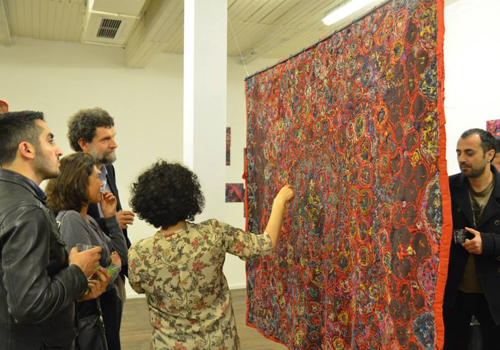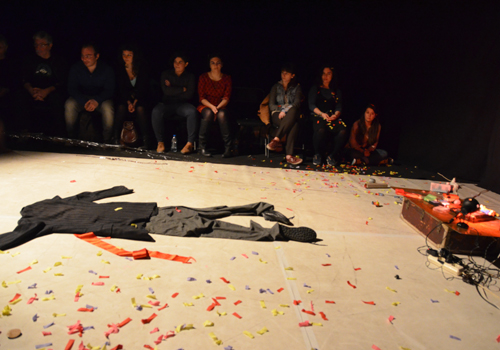Numerous exhibitions of contemporary art were organized in Turkey among the events dedicated to the 100th anniversary of the Armenian Genocide. Particularly in April, the Armenian Genocide is the main theme of artworks and performances in a number of Istanbul’s art venues.
Housed in a former tobacco warehouse, Depo, an initiative of Anadolu Kültür NGO, is the most active and notable platform for this kind of exhibitions and performing arts. Since the 9th International Istanbul Biennial in 2005, it has been used as an exhibition and project space for contemporary artists. In an interview with Epress.am, Depo Program Coordinator Asena Günal said that this year their gallery has mainly hosted exhibitions by descendants of Genocide victims and survivors.
“As a cultural manager and a social scientist I can say personal stories are much more powerful to make your word public. In these events we focused on personal stories of the victims of past atrocities which made it easier for the audience to relate to.
Narrating personal stories, stories of the families do open new channels of communication, which were impossible in the past, since official discourse has smothered them and made it impossible for people to hear these stories,” Günal said.
Among these personal stories presented in Depo on April 23 was an exhibition by Lebanese-Armenian artist Anita Toutikian entitled “Exbroideries”, as well as a photo exhibition by Brazilian-Armenian photographer Norair Chahinian entitled “The Power of Emptiness.”
Toutikian’s exhibition was dedicated to her Grandmother Hripsime, who had survived the Genocide and would never speak of it in words; instead, she expressed her emotions through embroideries.
In his exhibition, Chahinian presented photographs which were taken in Marash and Urfa – the native cities of his ancestors. The photographer said he had visited Eastern Turkey as a “local foreigner.”
Other art venues held exhibitions by Turkish artists also, as well as those, who created artwork on the Armenian Genocide from the perspective of “neither the perpetrator, nor the victim.”
At SALT Beyoğlu Art Center, in the framework of an exhibition entitled “A Century of Centuries,” artist Dilek Winchester in her work called “As If Nothing Has Ever Been Said Before Us” looks at the interrelation of the main languages of the Ottoman Empire.
“We are knocking on your doors with an emotion and arrogance unparalleled in world history and without fear of seeming like those who are conceited and behave as if nothing has ever been said before them."
Winchester transcribes this sentence phonetically in Turkish "but with letters from five alphabets: Armenian, Greek, Hebrew, Latin and Arabic, which were used by the multi-lingual population of the Ottoman Empire up until the Alphabet Reform enforced the use of the Latin alphabet in 1928."
In another piece Winchester brings up the issue of the way Turkish literature is being taught. The artist presented Vartan Pasha's novel "Akabi Hikayesi" which was published in Armenian in 1851, and "Taaşşuk-ı Talat ve Fitnat", a novel by Albanian writer Sami Frashëri which was published in Arabic in 1872, 21 years after Vartan Pasha published his "Akabi Hikayesi." And yet, as stated by Winchester, according to Turkish literary historians "the first novel written in Turkish" is Sami's 1872 book, rather than Vartan Pasha's "Akabi Hikayesi" just because the latter was written in Armenian.
“To ignore and forget our culture for such a reason is unwise,” Dilek Winchester said.
On April 25, artist Mihran Tomasyan presented his dance performance entitled “You Are Not a Fish After All” dedicated to Turkish-Armenian editor, journalist Hrant Dink who was assassinated in Istanbul on January 19, 2007. Tomasyan’s performance revolved around a poem by Oktay Rifat:
Don't cry Ahmet, Don't cry
Do not attempt to your gun
I swear on my honor
that these dark days will end
Big fish eat little fish they say
bullshit
Let sardines worry about it
You're not a fish Ahmet,
A little bit, little big more
The end will be bright.
During his performance Tomasyan recorded the poem, played it, broadcasted on radio, via microphone, handed tape recordings to the audience.
“My performance is not just about Dink; it is about all the people who were killed for being a minority, for those who still face discrimination because of their identity,” the Turkish-Armenian artist said.
According to Tomasyan, he has presented “You Are Not a Fish After All” in Armenia, too; however, it wasn’t well received by the Armenian audience. This, as explained by the artist, was because both in Turkey and Armenia, there is a need to reaffirm the connection between the audience and the performing arts.
 Epress.am News from Armenia
Epress.am News from Armenia



